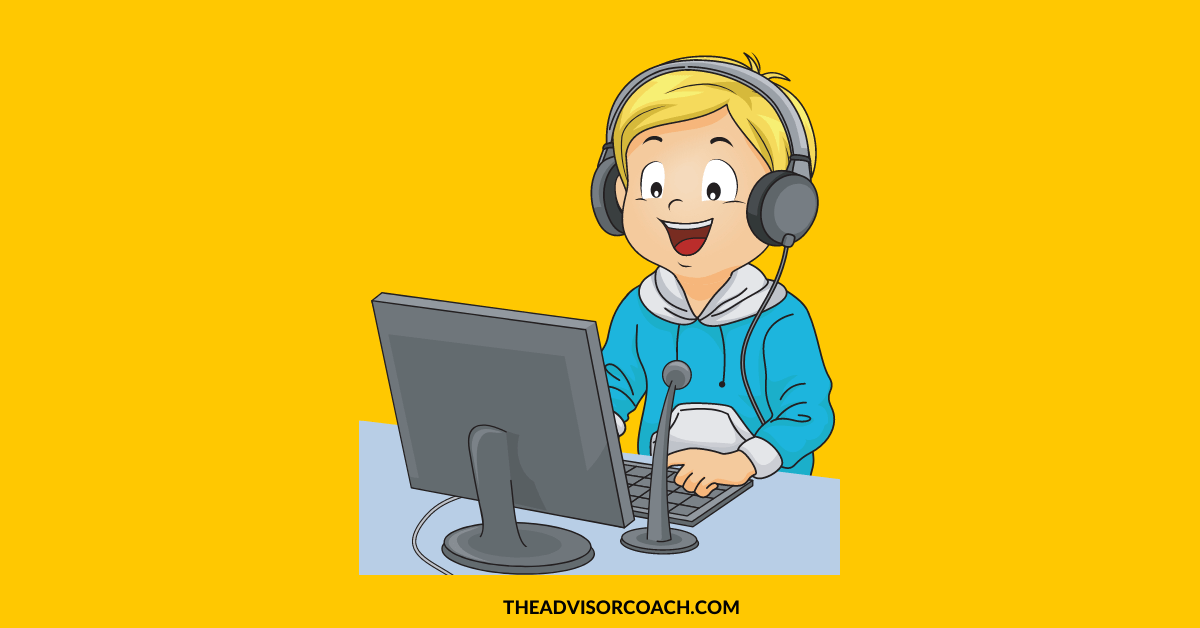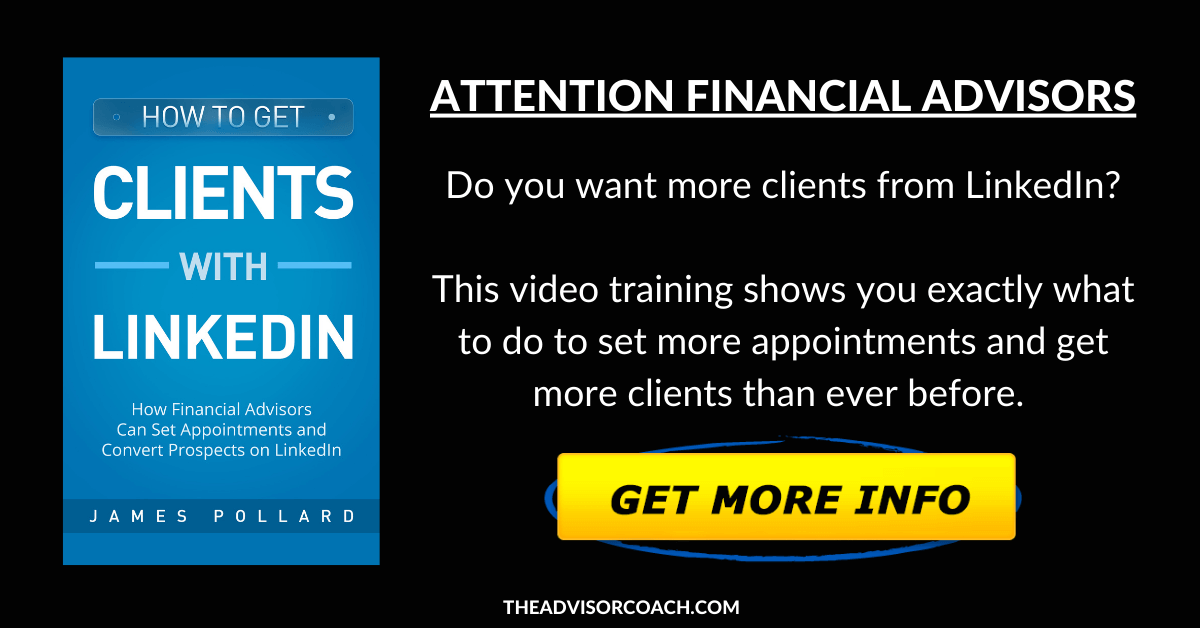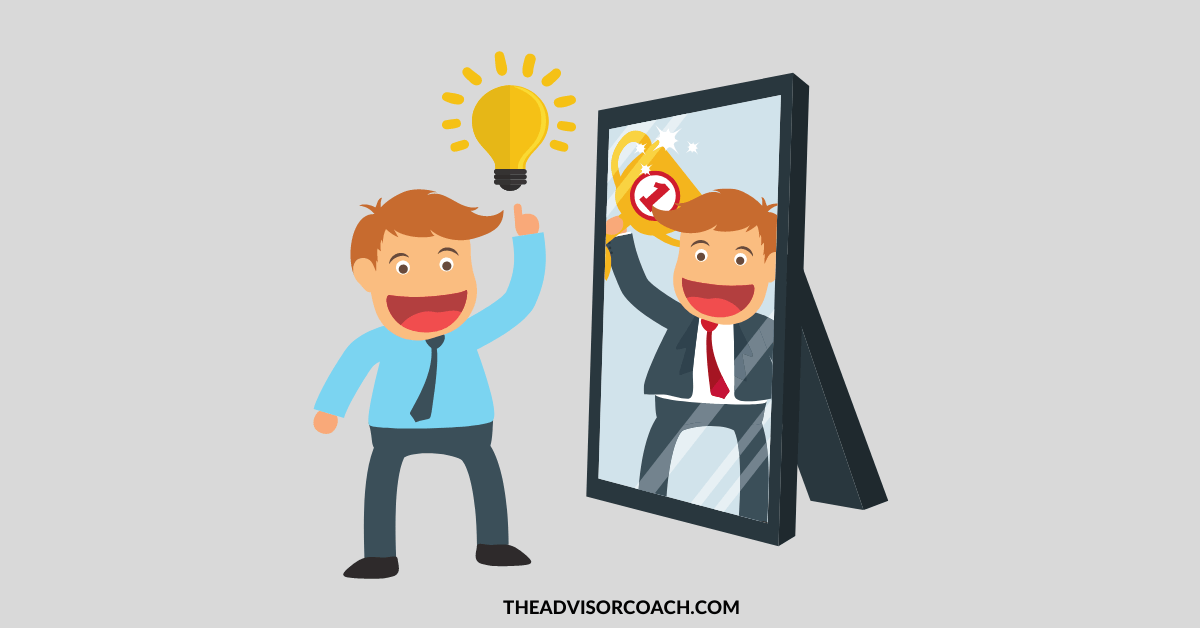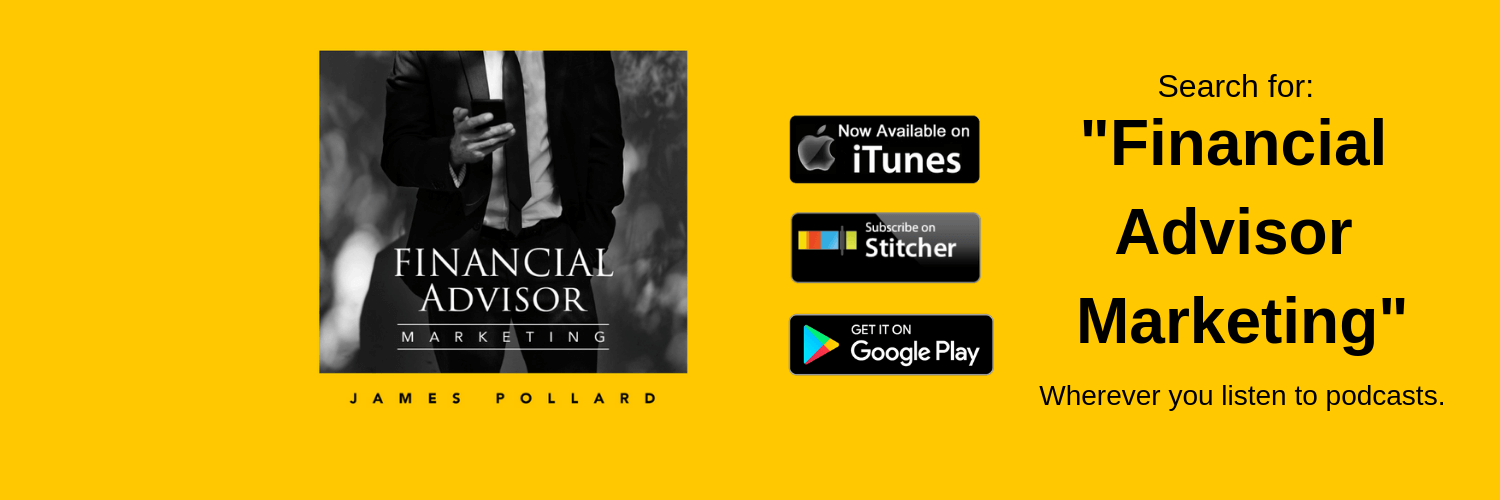3 Reasons Financial Advisors Should (And Shouldn't) Start A Podcast...Podcasts are all the rage these days.
I should know. I’ve been podcasting for many years. I had an old show back in the day and now I’m going live every Monday with the “Financial Advisor Marketing” podcast. Every so often I will get messages from financial advisors asking if they should start their own podcasts. It seems like every other day someone new launches a podcast. There are millions of the darn things out there… and for good reason, too. Having a podcast can be an incredible marketing tool and a whole lot of fun. Here are a few reasons financial advisors SHOULD start a podcast… 3 Reasons Financial Advisors SHOULD Start A Podcast...Reason #1: Podcasts Have Built-In LeverageOnce you create your podcast content, it can work for you whether you’re asleep, working, or on vacation because it has built-in leverage.
There’s something beautiful about creating something that continues to work on your behalf. A prospect could find a podcast you recorded two years ago and end up reaching out to you because of it. Plus, the longer you do your podcast, the more time a prospect can virtually spend with you. In my case, I just finished recording episode 50 of my “Financial Advisor Marketing” podcast. If each episode clocks in at about twenty minutes (give or take), that means I have more than sixteen hours of audio content available for people to consume. Reason #2: Podcasts Can Reach Many Target MarketsPodcasts are amazing tools for reaching specific types of audiences. There are shows out there for working mothers, pet owners, harness racers, and everyone in between.
This is excellent news for financial advisors who specialize in working with a certain niche because they can create content around that niche. Since many podcast player services also function as search engines, this makes it easier for their niche market to find them. For example, let’s say you’re a financial advisor who specializes in working with military families. If your target market types in “military” into their favorite podcasting service, there’s a good chance your show will be found… especially if you use the word “military” in your show and episode titles. Not only that but people in various niches will share podcasts with each other. This allows your podcast to grow through word-of-mouth while still reaching your desired audience. Either way, defining your niche is a critical step for building your business. If you’re not focused on who you serve, how will your audience ever find your podcast? Reason #3: Podcasts Build RelationshipsPodcasts are one of my favorite marketing tools because they allow you to show off your personality. Instead of hiding behind a keyboard, you’re hiding behind a microphone. :-)
With a podcast, people can hear your voice with all of its tonality and inflection. They can get a glimpse into what you’re like. They can listen to your stories and relate to you as a person. If you’ve ever listened to my show, you know how laid-back and casual I am. You also know that I go on rants and give controversial advice at times. That’s just me. Some people don’t like it and that’s okay because it allows the people who love what I do to get even closer to me. I’ve also been able to share stories about what I’m watching on TV, where I go out to eat, and how I spend my free time. In many ways, sharing that type of content has been far more impactful than the information about business and marketing. More people have emailed me commenting on my personal stories than all of the teaching I do in the show. This flies directly in the face of all the people who whine and scream about how you need to “provide value!” in every show. ALSO READ: 7 Traits Successful Financial Advisors Have (That Others Don't) Now, here are some reasons why financial advisors SHOULDN’T start a podcast… 3 Reasons Financial Advisors Should NOT Start A Podcast...Reason #1: They're Not Willing To Be ConsistentWhen I did my old podcast, I wasn’t consistent. I would release an episode on a Tuesday one week and a Thursday after that. Then, I sometimes waited two or three weeks in between episodes.
In other words, it wasn’t consistent. My audience shamed me about it, too. I remember getting messages from financial advisors telling me how much they wished I would just release episodes on the same day each week. So, I ended up hiring Jonathan Rivera from The Podcast Factory to produce my entire podcast from start to finish. He’s worked with legendary marketers such as Ben Settle and Doberman Dan and I am humbled to even share the same brand as those two. The Podcast Factory makes sure my episodes are released every week in rain, snow, sleet or shine. :-) They have literally never failed me. If you think you’ll struggle to be consistent, I strongly recommend hiring someone (or a company like The Podcast Factory) to help you stay on track. It can be a struggle to be “on” when you’ve got to record a show, so you want to have someone else involved to help keep you pumped up and focused. I’ve discovered that people value consistency more than practically anything else other than high-quality audio. They want to know that EVERY Monday, a new podcast episode will be released. Being consistent is a good thing because it allows you to “own” a particular day for your market. For example, if you release new episodes every Monday, your audience will begin thinking about you every Monday. If there was ever a strategy to help financial advisors stay top-of-mind, podcasting is it. I’ve even had people email me on Sunday telling me they can’t wait for the next episode. THAT’S the type of anticipation podcasting can build with your audience. Reason #2: They're Not Willing To Invest In ItA good podcast takes work. Some people want to take the crappiest mic they can find and start recording in Audacity with no professional mixing or mastering.
The result? Their podcast sounds like they recorded in a tin can… inside a toilet… with a mouth full of marshmallows. If you’re going to record a podcast, make sure you get quality gear. The microphone I recommend is the Shure SM7B but if you don’t want to shell out that much money, go with the BLUE Condenser Microphone. I'm an affiliate of both mics. Also, make sure you get a pop filter. They’re literally ten bucks or so and they prevent the popping sound that comes when you say words with “plosives”, such as “people” and “pain”. It kills me when I listen to a podcast with these popping sounds because it tells me that the host didn’t care enough to spend ten bucks for his or her audience. Keep in mind that investing in your podcast isn’t limited to money, either. It takes time to make good material. A lot of people think they can “wing it” and then wonder why nobody listens to their show. Reason #3: They Expect Instant SuccessPodcasting is typically a slow grind. Sure, some shows hit the ground running but they’re the exception rather than the rule.
According to stats published by Libsyn, the average podcast has 141 downloads in the first thirty days. If you’re getting more than that number, you are officially above-average. Go pop some champagne. If 141 downloads doesn’t sound like much to you, that’s because it’s not. However, downloads shouldn’t be your goal. As a financial advisor, your goal should be to set an appointment with your podcast listeners. Here’s how you can track appointments from your podcast… You can create a calendar URL that you only share on your podcast. If anyone uses that particular URL, you know they had to come from your show. ALSO READ: 8 Things Nobody Tells You About Being A Financial Advisor What I've Learned From My Podcast...After hosting two separate podcasts over the years, there are several nuggets of wisdom I’ve acquired that I’d like to pass on to you.
First, shorter shows are better. I PERSONALLY like listening to longer shows but there’s an old marketing adage that says “you are not your audience” and it applies here. Because in nearly every survey I’ve conducted about podcast length, people have told me they want shows to be less than thirty minutes. This makes sense because, according to the U.S. Census Bureau, the average one-way commute time is 26.1 minutes. I intentionally make my show to last in that commute window. A financial advisor can travel to work and begin to implement the advice/lessons learned from the episode. Next, don’t hesitate to ask your audience for feedback. I ask my listeners to email me and I love hearing from them. If one person asks a question, I can surmise that dozens of others are thinking the same thing. My listeners are responsible for some of my show’s content and I enjoy being able to help through the show. Also, don’t be afraid to have a show without guests. Sometimes people will procrastinate starting their podcast because they don’t have guests lined up for weeks in advance. Newsflash: you don’t need guests. At the time of this writing, I have YET to have a single guest on my podcast. Your show can be all about you and your audience. If you want to bring someone on, great. But you shouldn’t feel pressured to do it every week. After all, you’ve got a business to run. ALSO READ: 15 Financial Advisor Prospecting Tips In addition, start creating a content library so you never run out of ideas. Sometimes people will put off starting their podcast because they don’t know what they’ll talk about.
(Be sure to check out this article about content marketing for financial advisors, too.) Here’s what you should talk about on your show: whatever your listeners are interested in. This ties back to asking for feedback. If you can get ideas from your niche, you’ll never run out of things to talk about. This is also why it’s important to be genuinely interested and involved in your niche market. You will likely read their blogs, attend their conferences, listen to other podcasts, and engage with influencers on social media. All of these are places where you get inspiration for your show. Another thing - don’t be afraid to promote yourself. YOU are the podcast. It is YOUR show. You can do what YOU want. A lot of financial advisors are so afraid of being “salesy” that they never talk about themselves or how they help their clients. This holds them back from helping as many people as possible. We live in a society where people gain value through exchange. It just so happens that people exchange money to attain value from others. If you have something that can enrich other people and make their lives easier, don’t ever be afraid to make it known. If people want to benefit from your services, they will reach out to you. That’s called value-exchange. Finally, get help if you need it… and you probably will need it. Like I said earlier, I hired Jonathan from The Podcast Factory and things have been streamlined ever since. He’s professional, punctual, and fast to help if there are any challenges. He’s also a business/marketing-minded individual, which is an exceedingly rare combination. This means not only can he help you with your show but he can give you pointers on how to grow your business as a whole. (By the way, if you want to get featured on radio shows and podcasts, check this out: Free Radio Guest Interviews Booking Service) The Bottom LineStarting a podcast can be a fun and rewarding experience. I’ve learned a lot from releasing my own show over the years.
Podcasting isn’t for everyone… especially those who aren’t willing to be consistent and invest in it or those who expect instant success. However, the financial advisors who are willing to put in the effort to make it great may find their efforts pay off in spades. REGISTER FOR THE WEBINAR: 3 Counterintuitive Ways Financial Advisors Can Get More Clients With Email Marketing |





